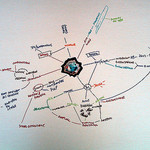Classification systems allows us to take complex ideas and an assortment of items and turn it all into a group of organized material. With tags and links – as we discover in the Clay Shirky article – you can organize your objects as well as your thought process. Collaboration of ideas is nothing without a process of hierarchy. When you can narrow down your findings, along with your research tools, you can present your information and processes in a more clean, reformed, way that will be an advantage to your audience and yourself. By adding tags, and links, in articles or even social media, you can pull groups into your work and include more collaboration into your work. I have three items nearby right now; a pencil, a phone, and a piece of paper. I would organize these materials by categories of writing utensils, technology, and storage of information. A sub category of that will then become school materials, digital information, physical information. This can go into multiple subcategories as digital and physical media can go across many different platforms or even link together. This hierarchy system is similar to what Clay Shirky Talks about in the article “Ontology is overrated: Categories, Links, and tags”. This is the typical way of categorization, going through levels and ending with a subcategory that can ultimately mesh through all categories above it. A big point he draws on is how everything we like to think we know about categorization, is wrong. He goes by defining ontology and how it is the straight, explicit, meaning of what IT is. I agree with what he says, and how it can be used in the real world no matter if its a digital platform or a physical one.
 Picture courtesy of flikr user Sedimentation
Picture courtesy of flikr user Sedimentation
A great way to start off the creative process is to create a web of thoughts and categorize by simple characteristics and commonalities. Rushkoff tells us that decision making has changed completely all because of the web. I agree with this. Because on the internet it is the programmers and developers who are in control and determine what is published and therefore read by you. With the items I have, I categorized them my way and like a programmer I control what is released to you. Certainly you can disagree with me, or like Rushkoff states, you may always choose none of the above. Withholding choice is what distinguishes life, from imitators. And like I stated at the beginning of this post, tagging is very crucial and a great way to put [yourself] in control of your media and programming.
You must be logged in to post a comment.